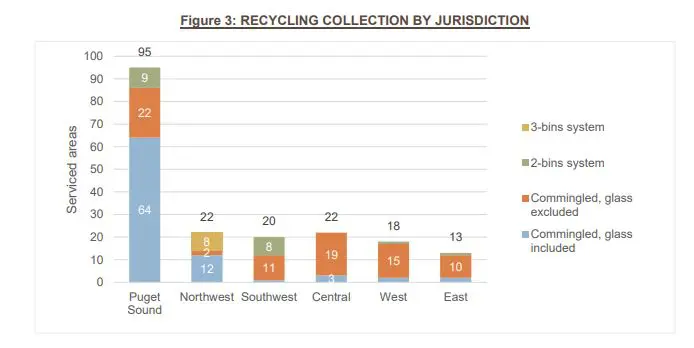Waste and recycling collection is changing across the country as the cost of processing recycling increases and cities make commitments to reduce waste and climate emissions. With these changes, cities are re-evaluating waste and recycling collection systems.
The City has a contract with Sanitary Service Company (SSC) to manage residential waste collection in Bellingham. In February 2023, Bellingham City Council approved a resolution to allow the City to modify its contract with SSC to include these changes:
- Switch from a three-bin, curb-sorted recycling system for single-family residences to a single-stream recycling system that uses one 96-gallon bin for all recyclables to reduce wind-blown litter, decrease operational costs, and improve customer convenience.
- Add organic waste collection as a standard service for all single-family residential customers. This reduces the amount of garbage that is shipped long distances to landfills while also turning organic waste into compost and other beneficial soil products. This requirement also helps Bellingham come into compliance with future statewide requirements, supports Bellingham climate action goals by reducing methane gas emissions, and supports the Whatcom County Comprehensive Solid and Hazardous Waste Management Plan by increasing landfill diversion.
SSC implemented single-stream recycling in 2024 and FoodPlus! organic waste management in early 2025. All Bellingham residents living on lots with four units or less who do not already participate in FoodPlus! have now received the service.
Visit SSC’s website for more information about waste and recycling collection services, rates and schedules.
Organic Waste Collection
Responding to Community Feedback
We are listening! Thank you for sharing your feedback with us about the organic waste collection requirement. We are committed to making this transition smoother for Bellingham residents while still being in compliance with future statewide requirements and making progress towards waste reduction and climate action goals. In response to feedback, we are making a few updates:
- We have worked with SSC to make smaller FoodPlus! bins available to address space constraint concerns. 30-gallon FoodPlus! bins are available upon request to SSC.
- Reminder: If you live on a lot or parcel with two to four units, you may be eligible to combine waste collection services with your neighbor(s) to reduce the number of bins on your lot and the cost of the service.
- To address concerns about the cost, we are evaluating expanding our Customer Assistance Program to provide more low-income reduced rate options.
- Discounted rates are currently available for low-income seniors and those with permanent disabilities.
- Customers are also seeing rate reductions when they reduce the frequency of their garbage collection to every other week or monthly as a result of diverting organic waste into their FoodPlus! bins.
- We partnered with Sustainable Connections to offer free countertop compost caddies to Bellingham SSC customers for improved customer convenience. You can keep a caddy in your kitchen to reduce the number of trips you need to take to your outdoor FoodPlus! bin. Take this survey to share feedback and request a caddy.
We will continue to collect feedback and evaluate options.
Frequently Asked Questions
Other
Single-Stream Recycling
More Information
- 2024 Organics Management Laws – Department of Ecology
- December 5, 2024 News Release – Organic waste collection coming to all Bellingham single-family households in 2025
- February 27, 2023 Bellingham City Council meeting – Proposed Resolution Regarding Single Stream Recycling and Organic Materials Collection (Item 23645)
- February 22, 2023 News Release – City Council to consider request to change recycling and waste collection services
- October 24, 2022 Bellingham City Council meeting – Single Stream Recycling Pilot Update (Item 23220)
- 2020 State of Curbside Recycling in U.S. Report by the Recycling Partnership
- 2019 State of Residential Recycling and Organics Collection in Washington State Report by Zero Waste Washington
- City of Bellingham Solid Waste Management
- Whatcom County WasteWise Tool
Contact
Please contact SSC at info@ssc-inc.com or (360) 734-3490 with questions about your waste and recycling collection services. For other questions, please contact the City at AskPW@cob.org.


